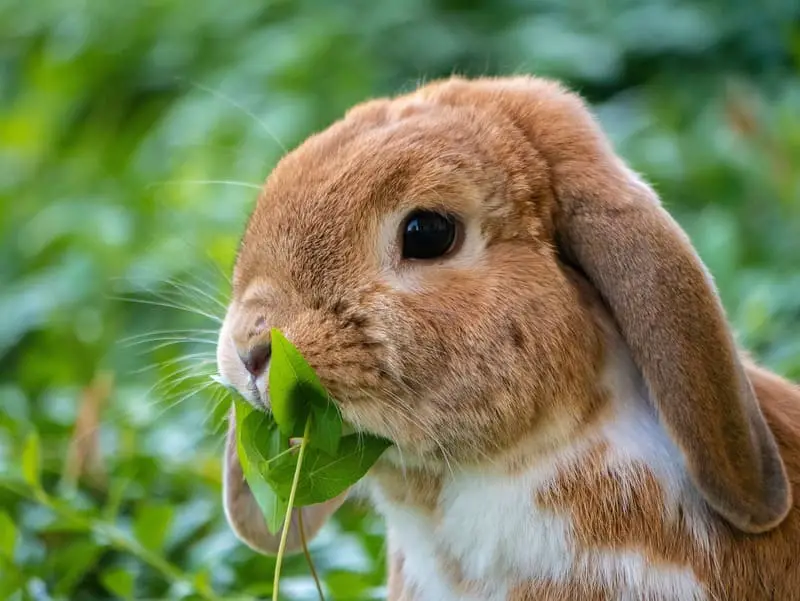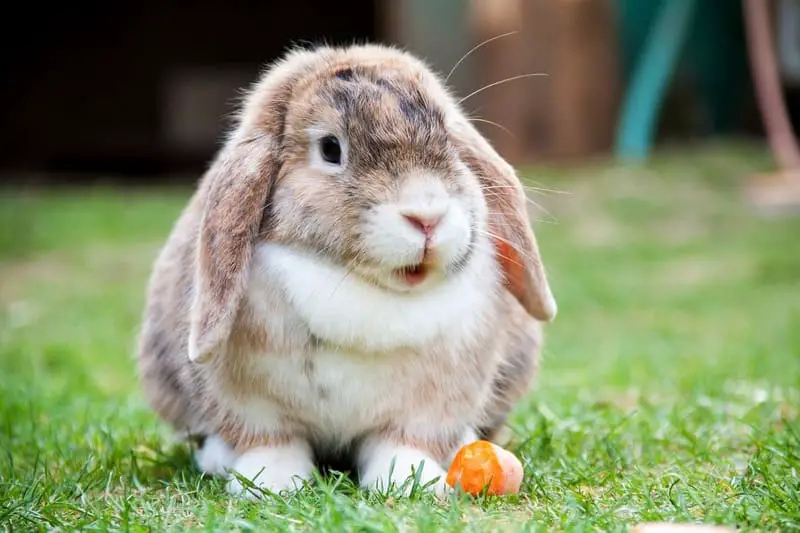Rabbits are herbivorous animals, which means their natural diet primarily consists of plant materials. In the wild, they forage for a wide variety of plant-based foods, such as grasses, herbs, leaves, and bark. These plant materials provide essential nutrients, including fiber, vitamins, and minerals. Incorporating a variety of vegetables into your rabbit’s diet serves to replicate their natural diet and ensures they receive a balanced nutritional intake.

Why Vegetables Are Important in a Rabbit’s Diet
- Fiber: Vegetables are rich in dietary fiber, which is crucial for a rabbit’s digestive health. Fiber helps maintain healthy gut motility, prevents gastrointestinal issues like stasis, and aids in the prevention of obesity.
- Vitamins and Minerals: Vegetables are excellent sources of essential vitamins and minerals, including vitamin A, vitamin C, vitamin K, and various B vitamins. These nutrients are vital for your rabbit’s overall health and well-being.
- Hydration: Many vegetables have a high water content, which helps keep your rabbit hydrated. Proper hydration is essential to prevent urinary tract issues and promote healthy kidney function.
Safe Vegetables for Rabbits
Not all vegetables are safe for rabbits, and some can be harmful to their health. It’s crucial to know which vegetables are suitable for your rabbit to avoid potential health issues. Here is a list of safe vegetables that you can feed your rabbit:
Leafy Greens:
- Romaine Lettuce: This type of lettuce is safe for rabbits in moderation, but avoid iceberg lettuce as it has lower nutritional value.
- Kale: A highly nutritious leafy green rich in vitamins and minerals.
- Spinach: While spinach is safe, it should be given in limited quantities due to its high oxalate content.
- Arugula: Provides a peppery flavor and is a good source of fiber.
- Dandelion Greens: A natural forage option that rabbits enjoy and is rich in nutrients.
Herbs:
- Parsley: Aromatic and rich in vitamin C and K.
- Cilantro: A flavorful herb that provides vitamins and antioxidants.
- Basil: Another aromatic herb that rabbits find appealing.
- Mint: Suitable in small amounts, mint can add variety to your rabbit’s diet.
Vegetables:
- Carrots: Carrots are safe and a good source of beta-carotene, but they should be given in moderation due to their sugar content.
- Bell Peppers: A colorful and crunchy option that offers vitamin C.
- Broccoli: High in fiber and a variety of vitamins.
- Cucumber: A hydrating option with a mild taste.
- Zucchini: Low in calories and a good source of fiber.
- Celery: A crunchy vegetable that rabbits can enjoy.
- Green Beans: Offer fiber and a satisfying crunch.
- Brussels Sprouts: Rich in vitamins and fiber but should be given sparingly.
- Pea Pods: Rabbits can eat the entire pod, providing both fiber and a sweet taste.
Cruciferous Vegetables:
- Cabbage: Safe in small amounts, but too much can lead to gas or digestive issues.
- Cauliflower: Another cruciferous option that can be given in moderation.
- Bok Choy: A type of Chinese cabbage that rabbits may enjoy.
Squash and Pumpkin:
- Acorn Squash: A nutritious and flavorful option.
- Butternut Squash: High in fiber and vitamins.
- Pumpkin: A seasonal treat that rabbits can enjoy in moderation.

Moderation and Variety
While it’s important to provide your rabbit with a diverse selection of vegetables, moderation is key. Overfeeding certain vegetables can lead to health problems, such as obesity or gastrointestinal upset. Additionally, some vegetables may have higher sugar or oxalate content, which can be problematic when consumed excessively.
Here are some guidelines for ensuring moderation and variety in your rabbit’s vegetable intake:
- Rotate Vegetables: Instead of offering the same vegetables every day, rotate them to provide a variety of nutrients and flavors. This prevents your rabbit from getting bored with their diet and ensures they receive a broader range of nutrients.
- Portion Control: Pay attention to the portion sizes of vegetables you provide. Rabbits have different dietary needs depending on their age, size, and activity level. It’s advisable to consult with your veterinarian to determine the appropriate portion sizes for your specific rabbit.
- Monitor for Allergies or Sensitivities: Just like humans, rabbits can have individual sensitivities to certain foods. Watch for any signs of digestive upset or allergies when introducing new vegetables. If you notice any adverse reactions, remove the problematic vegetable from their diet.
- Limit High-Calcium and High-Oxalate Vegetables: Some vegetables, such as spinach and parsley, are high in oxalates, while others, like kale and broccoli, are relatively high in calcium. Too much of these vegetables can contribute to the formation of kidney stones, so they should be given in moderation.
- Avoid Starchy Vegetables: Starchy vegetables like potatoes and sweet potatoes should be avoided as they have minimal nutritional value for rabbits and can contribute to weight gain.
Preparing and Serving Vegetables
Properly preparing and serving vegetables to your rabbit is essential to ensure their safety and enjoyment. Follow these guidelines for the best practices in preparing and presenting vegetables:
Washing:
- Always wash vegetables thoroughly before offering them to your rabbit to remove any pesticides, dirt, or contaminants.
- Dry the vegetables properly to prevent excess moisture, as wet food can cause digestive issues in rabbits.
Chopping:
- Cut vegetables into bite-sized pieces that are easy for your rabbit to eat. Smaller pieces are not only safer but also more convenient for your pet.
Serving:
- Introduce new vegetables gradually to allow your rabbit’s digestive system to adjust. Start with a small amount and observe for any adverse reactions.
- Offer fresh vegetables in a clean dish or directly on the cage floor. This mimics their natural foraging behavior.
- Remove any uneaten vegetables after a few hours to prevent spoilage.
Presentation:
- Vary the presentation of vegetables to make mealtime more interesting. You can scatter them around the cage or use puzzle feeders to stimulate your rabbit’s mind.
Avoid Seasonings:
- Do not add salt, sugar, or any seasonings to the vegetables. Rabbits should consume plain, unseasoned vegetables.
Foods to Avoid
While it’s crucial to know what vegetables are safe for your rabbit, it’s equally important to be aware of foods that should be avoided entirely. Feeding your rabbit the wrong foods can lead to health problems and potential toxicity. Here are some foods that should be kept away from your rabbit:
- Toxic Plants: Some common garden plants and ornamental flowers are toxic to rabbits. Examples include azaleas, daffodils, lilies, and rhubarb. Ensure your rabbit cannot access these plants.
- Avocado: Avocado is highly toxic to rabbits and should be strictly avoided.
- Onions and Garlic: Onions and garlic contain compounds that can be harmful to rabbits if consumed in significant quantities.
- Chocolate and Caffeine: These items are toxic to many animals, including rabbits. Keep them away from your pet.
- Processed or High-Sugar Foods: Avoid feeding your rabbit processed foods, sugary snacks, or items with added preservatives.
- Moldy or Spoiled Food: Always provide fresh, high-quality vegetables. Moldy or spoiled food can be harmful to rabbits.
- Seeds and Pits: Some fruit seeds and pits contain substances that can be toxic. Remove seeds and pits from fruits like apples and cherries before offering them to your rabbit.
- Cereals and Grains: While rabbits are herbivores, their primary diet should consist of hay, fresh vegetables, and a moderate amount of pellets. Avoid giving them cereals and grains, as they are not suitable for their digestion.

Introducing Vegetables to Young and Adult Rabbits
Introducing vegetables to rabbits at different stages of life requires some considerations. Here’s how to approach feeding vegetables to both young and adult rabbits:
Young Rabbits (Kits):
- Young rabbits, or kits, should primarily be fed their mother’s milk until they are about three weeks old.
- After three weeks, you can gradually introduce small amounts of leafy greens like lettuce and herbs.
- As they grow, increase the variety and quantity of vegetables in their diet. By three to four months of age, they can enjoy a similar variety of vegetables as adult rabbits.
Adult Rabbits:
- Adult rabbits can enjoy a more extensive range of vegetables in their diet.
- Start with small amounts of one or two safe vegetables and gradually expand the variety.
- Be attentive to their preferences and sensitivities. Some rabbits may have individual preferences for certain vegetables.
Seniors:
- Older rabbits may have specific dietary needs. Consult your veterinarian for guidance on the appropriate diet for senior rabbits.
- Consider softer vegetables and foods that are easier to chew for senior rabbits with dental issues.
Signs of Overfeeding or Dietary Issues
Monitoring your rabbit’s diet is essential to ensure they are healthy and receiving the right nutrition. Keep an eye out for signs of overfeeding or dietary issues, such as:
- Obesity: An overweight rabbit is at risk of various health problems. If you notice your rabbit gaining excessive weight, adjust their diet and consult your veterinarian for guidance.
- Digestive Upset: Signs of digestive issues may include diarrhea, soft stools, or gastrointestinal discomfort. If you observe any of these signs, review their diet and consider removing problematic vegetables.
- Loss of Appetite: If your rabbit suddenly loses interest in food, it may be a sign of an underlying health issue. Consult your veterinarian for a thorough examination.
- Abnormal Urine or Feces: Changes in the color, consistency, or odor of urine or feces can be indicative of a dietary problem or a health issue.
- Excessive Thirst: Rabbits should have a stable and moderate water intake. If you notice your rabbit drinking excessively, it could indicate a problem with their diet or health.
Special Considerations
There are specific situations and considerations that may impact your rabbit’s diet. These include:
Pregnancy and Nursing:
- Pregnant and nursing rabbits have increased nutritional requirements. Ensure they receive a balanced diet that supports the growth of their young.
Health Conditions:
- Rabbits with certain health conditions may require a modified diet. Always follow your veterinarian’s dietary recommendations for rabbits with specific health issues.
Weight Management:
- If your rabbit is overweight or underweight, work with your veterinarian to develop a diet plan that helps them reach and maintain a healthy weight.
Dental Health:
- Rabbits with dental issues may require softer or mashed vegetables to accommodate their dental problems.
Medications:
- If your rabbit is taking medications, consult your veterinarian to ensure that the medications do not interact with their diet.
Conclusion
In conclusion, providing your rabbit with a balanced diet that includes a variety of safe and nutritious vegetables is essential for their overall health and well-being. By understanding which vegetables are suitable for rabbits, practicing moderation, and monitoring their diet, you can ensure that your furry friend enjoys a happy and healthy life. Remember to consult with your veterinarian for personalized dietary recommendations and to address any specific dietary concerns for your rabbit. With the right knowledge and care, you can provide your rabbit with a diet that keeps them hopping with joy.
